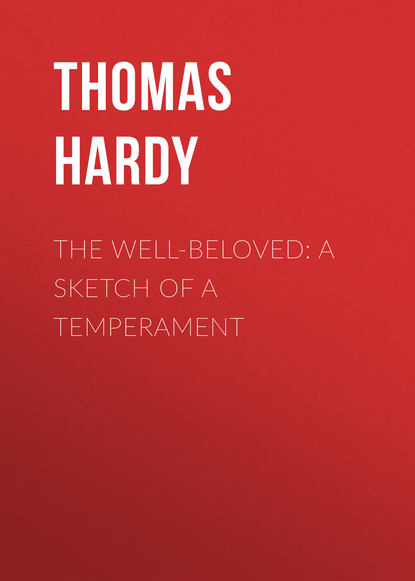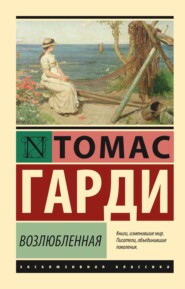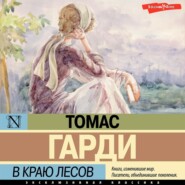По всем вопросам обращайтесь на: info@litportal.ru
(©) 2003-2025.
✖
The Well-Beloved: A Sketch of a Temperament
Настройки чтения
Размер шрифта
Высота строк
Поля
Pierston was not backward at this critical juncture, despite unpleasant sensations. But it was the historic ingredient in this genealogical passion – if its continuity through three generations may be so described – which appealed to his perseverance at the expense of his wisdom. The mother was holding the daughter’s hand; she took Pierston’s, and laid Avice’s in it.
No more was said in argument, and the thing was regarded as determined. Afterwards a noise was heard upon the window-panes, as of fine sand thrown; and, lifting the blind, Pierston saw that the distant lightship winked with a bleared and indistinct eye. A drizzling rain had come on with the dark, and it was striking the window in handfuls. He had intended to walk the two miles back to the station, but it meant a drenching to do it now. He waited and had supper; and, finding the weather no better, accepted Mrs. Pierston’s invitation to stay over the night.
Thus it fell out that again he lodged in the house he had been accustomed to live in as a boy, before his father had made his fortune, and before his own name had been heard of outside the boundaries of the isle.
He slept but little, and in the first movement of the dawn sat up in bed. Why should he ever live in London or any other fashionable city if this plan of marriage could be carried out? Surely, with this young wife, the island would be the best place for him. It might be possible to rent Sylvania Castle as he had formerly done – better still to buy it. If life could offer him anything worth having it would be a home with Avice there on his native cliffs to the end of his days.
As he sat thus thinking, and the daylight increased, he discerned, a short distance before him, a movement of something ghostly. His position was facing the window, and he found that by chance the looking-glass had swung itself vertical, so that what he saw was his own shape. The recognition startled him. The person he appeared was too grievously far, chronologically, in advance of the person he felt himself to be. Pierston did not care to regard the figure confronting him so mockingly. Its voice seemed to say ‘There’s tragedy hanging on to this!’ But the question of age being pertinent he could not give the spectre up, and ultimately got out of bed under the weird fascination of the reflection. Whether he had overwalked himself lately, or what he had done, he knew not; but never had he seemed so aged by a score of years as he was represented in the glass in that cold grey morning light. While his soul was what it was, why should he have been encumbered with that withering carcase, without the ability to shift it off for another, as his ideal Beloved had so frequently done?
By reason of her mother’s illness Avice was now living in the house, and, on going downstairs, he found that they were to breakfast en tete-a-tete. She was not then in the room, but she entered in the course of a few minutes. Pierston had already heard that the widow felt better this morning, and elated by the prospect of sitting with Avice at this meal he went forward to her joyously. As soon as she saw him in the full stroke of day from the window she started; and he then remembered that it was their first meeting under the solar rays.
She was so overcome that she turned and left the room as if she had forgotten something; when she re-entered she was visibly pale. She recovered herself, and apologized. She had been sitting up the night before the last, she said, and was not quite so well as usual.
There may have been some truth in this; but Pierston could not get over that first scared look of hers. It was enough to give daytime stability to his night views of a possible tragedy lurking in this wedding project. He determined that, at any cost to his heart, there should be no misapprehension about him from this moment.
‘Miss Pierston,’ he said as they sat down, ‘since it is well you should know all the truth before we go any further, that there may be no awkward discoveries afterwards, I am going to tell you something about myself – if you are not too distressed to hear it?’
‘No – let me hear it.’
‘I was once the lover of your mother, and wanted to marry her, only she wouldn’t, or rather couldn’t, marry me.’
‘O how strange!’ said the girl, looking from him to the breakfast things, and from the breakfast things to him. ‘Mother has never told me that. Yet of course, you might have been. I mean, you are old enough.’
He took the remark as a satire she had not intended. ‘O yes – quite old enough,’ he said grimly. ‘Almost too old.’
‘Too old for mother? How’s that?’
‘Because I belonged to your grandmother.’
‘No? How can that be?’
‘I was her lover likewise. I should have married her if I had gone straight on instead of round the corner.’
‘But you couldn’t have been, Mr. Pierston! You are not old enough? Why, how old are you? – you have never told me.’
‘I am very old.’
‘My mother’s, and my grandmother’s,’ said she, looking at him no longer as at a possible husband, but as a strange fossilized relic in human form. Pierston saw it, but meaning to give up the game he did not care to spare himself.
‘Your mother’s and your grandmother’s young man,’ he repeated.
‘And were you my great-grandmother’s too?’ she asked, with an expectant interest in his case as a drama that overcame her personal considerations for a moment.
‘No – not your great-grandmother’s. Your imagination beats even my confessions!.. But I am VERY old, as you see.’
‘I did not know it!’ said she in an appalled murmur. ‘You do not look so; and I thought that what you looked you were.’
‘And you – you are very young,’ he continued.
A stillness followed, during which she sat in a troubled constraint, regarding him now and then with something in her open eyes and large pupils that might have been sympathy or nervousness. Pierston ate scarce any breakfast, and rising abruptly from the table said he would take a walk on the cliffs as the morning was fine.
He did so, proceeding along the north-east heights for nearly a mile. He had virtually given Avice up, but not formally. His intention had been to go back to the house in half-an-hour and pay a morning visit to the invalid; but by not returning the plans of the previous evening might be allowed to lapse silently, as mere pourparlers that had come to nothing in the face of Avice’s want of love for him. Pierston accordingly went straight along, and in the course of an hour was at his Budmouth lodgings.
Nothing occurred till the evening to inform him how his absence had been taken. Then a note arrived from Mrs. Pierston; it was written in pencil, evidently as she lay.
‘I am alarmed,’ she said, ‘at your going so suddenly. Avice seems to think she has offended you. She did not mean to do that, I am sure. It makes me dreadfully anxious! Will you send a line? Surely you will not desert us now – my heart is so set on my child’s welfare!’
‘Desert you I won’t,’ said Jocelyn. ‘It is too much like the original case. But I must let her desert me!’
On his return, with no other object than that of wishing Mrs. Pierston good-bye, he found her painfully agitated. She clasped his hand and wetted it with her tears.
‘O don’t be offended with her!’ she cried. ‘She’s young. We are one people – don’t marry a kimberlin! It will break my heart if you forsake her now! Avice!’
The girl came. ‘My manner was hasty and thoughtless this morning,’ she said in a low voice. ‘Please pardon me. I wish to abide by my promise.’
Her mother, still tearful, again joined their hands; and the engagement stood as before.
Pierston went back to Budmouth, but dimly seeing how curiously, through his being a rich suitor, ideas of beneficence and reparation were retaining him in the course arranged by her mother, and urged by his own desire in the face of his understanding.
V. ON THE VERGE OF POSSESSION
In anticipation of his marriage Pierston had taken a new red house of the approved Kensington pattern, with a new studio at the back as large as a mediaeval barn. Hither, in collusion with the elder Avice – whose health had mended somewhat – he invited mother and daughter to spend a week or two with him, thinking thereby to exercise on the latter’s imagination an influence which was not practicable while he was a guest at their house; and by interesting his betrothed in the fitting and furnishing of this residence to create in her an ambition to be its mistress.
It was a pleasant, reposeful time to be in town. There was nobody to interrupt them in their proceedings, and, it being out of the season, the largest tradesmen were as attentive to their wants as if those firms had never before been honoured with a single customer whom they really liked. Pierston and his guests, almost equally inexperienced – for the sculptor had nearly forgotten what knowledge of householding he had acquired earlier in life – could consider and practise thoroughly a species of skeleton-drill in receiving visitors when the pair should announce themselves as married and at home in the coming winter season.
Avice was charming, even if a little cold. He congratulated himself yet again that time should have reserved for him this final chance for one of the line. She was somewhat like her mother, whom he had loved in the flesh, but she had the soul of her grandmother, whom he had loved in the spirit – and, for that matter, loved now. Only one criticism had he to pass upon his choice: though in outward semblance her grandam idealized, she had not the first Avice’s candour, but rather her mother’s closeness. He never knew exactly what she was thinking and feeling. Yet he seemed to have such prescriptive rights in women of her blood that her occasional want of confidence did not deeply trouble him.
It was one of those ripe and mellow afternoons that sometimes colour London with their golden light at this time of the year, and produce those marvellous sunset effects which, if they were not known to be made up of kitchen coal-smoke and animal exhalations, would be rapturously applauded. Behind the perpendicular, oblique, zigzagged, and curved zinc ‘tall-boys,’ that formed a grey pattern not unlike early Gothic numerals against the sky, the men and women on the tops of the omnibuses saw an irradiation of topaz hues, darkened here and there into richest russet.
There had been a sharp shower during the afternoon, and Pierston – who had to take care of himself – had worn a pair of goloshes on his short walk in the street. He noiselessly entered the studio, inside which some gleams of the same mellow light had managed to creep, and where he guessed he should find his prospective wife and mother-in-law awaiting him with tea. But only Avice was there, seated beside the teapot of brown delf, which, as artists, they affected, her back being toward him. She was holding her handkerchief to her eyes, and he saw that she was weeping silently.
In another moment he perceived that she was weeping over a book. By this time she had heard him, and came forward. He made it appear that he had not noticed her distress, and they discussed some arrangements of furniture. When he had taken a cup of tea she went away, leaving the book behind her.
Pierston took it up. The volume was an old school-book; Stievenard’s ‘Lectures Francaises,’ with her name in it as a pupil at Sandbourne High School, and date-markings denoting lessons taken at a comparatively recent time, for Avice had been but a novice as governess when he discovered her.
For a school-girl – which she virtually was – to weep over a school-book was strange. Could she have been affected by some subject in the readings? Impossible. Pierston fell to thinking, and zest died for the process of furnishing, which he had undertaken so gaily. Somehow, the bloom was again disappearing from his approaching marriage. Yet he loved Avice more and more tenderly; he feared sometimes that in the solicitousness of his affection he was spoiling her by indulging her every whim.
He looked round the large and ambitious apartment, now becoming clouded with shades, out of which the white and cadaverous countenances of his studies, casts, and other lumber peered meditatively at him, as if they were saying, ‘What are you going to do now, old boy?’ They had never looked like that while standing in his past homely workshop, where all the real labours of his life had been carried out. What should a man of his age, who had not for years done anything to speak of – certainly not to add to his reputation as an artist – want with a new place like this? It was all because of the elect lady, and she apparently did not want him.
Pierston did not observe anything further in Avice to cause him misgiving till one dinner-time, a week later, towards the end of the visit. Then, as he sat himself between her and her mother at their limited table, he was struck with her nervousness, and was tempted to say, ‘Why are you troubled, my little dearest?’ in tones which disclosed that he was as troubled as she.
‘Am I troubled?’ she said with a start, turning her gentle hazel eyes upon him. ‘Yes, I suppose I am. It is because I have received a letter – from an old friend.’
‘You didn’t show it to me,’ said her mother.
‘No – I tore it up.’
‘Why?’

















